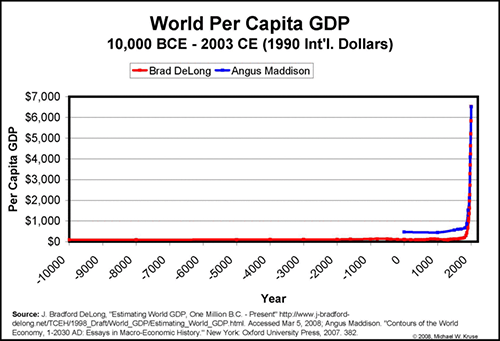Yes, Elon Musk is better than you
January 11th, 2024
Forget Musk’s efforts to save the human race, transition the world from carbon fuels, his other projects. And forget the Gates Foundation’s attempts to end malaria. And Andrew Carnegie’s libraries. Forget philanthropic projects of the wealthy. Or whether those projects are driven by ego or love of mankind. Put all that aside.
Our ancestors lived in caves, infested by parasites, chased by predators, constantly on the edge of starvation. Today we have nice things like indoor toilets and medicine. Electric light, refrigerated food, airliners, the Internet. We didn’t steal that wealth from other cavemen or from space aliens. Wealth isn’t a zero-sum game.
People created those technologies, that wealth. Out of plants and animals, dirt and air, and their own cleverness and work. Who did that? All of us, yes, but a few made vastly larger contributions than others.
Our society is wealthy because of Boulton’s engines, Carnegie’s mills, Vanderbilt’s railroads, Edison’s lights, Gates’ software, and Musk’s cars and rockets. Most of us have always plowed our farms, woven our cloth, done our jobs. And mostly broken even – fed ourselves, raised our children, helped our neighbors survive…and created very little that was new.
But some people are better at creating wealth than others. Just as an Albert Einstein is rare, or a Tiger Woods, or a William Shakespeare is rare, there are a few rare people who are vastly – incredibly – better at creating wealth than most everyone else. Today we call them “billionaires”.
They may not be better than most of us at physics, or golf, or literature, or in any other way, but they have a rare talent for creating wealth. Billionaire’s money (when honestly earned; I exclude crony capitalists and kleptocrats) mostly reflects value created. Value that benefits us all.
Earning a billion dollars is really difficult. See how many try, and how few succeed.
And the living standard at $100 million is virtually identical to that of $100 billion. Most rational people retire when they have enough – long before billionaire status. We are very lucky that a few of these astoundingly productive and capable people keep working – keep chasing dreams, keep creating wealth – long after their personal material needs are satisfied. They made our world, and will make our future.
Sure, Musk makes us look bad. But only in the sense that Mahatma Gandhi does. Nobody should feel jealous of Shakespeare’s writing, Edison’s inventiveness, Einstein’s discoveries. Nor should we resent them for their talent and success. Au contraire; we should celebrate them.
[adapted from a comment on https://fakenous.substack.com/p/elon-musk-is-better-than-you]
Rewards, incentives, and fairness
May 26th, 2017
In a comment on SlateStarCodex today the author (“leoboiko”) advocates a programme of socialism under the assumption that intelligence and ability are inherited, rather than earned, by their possessors. She said,
For one thing, this means that the idea of “meritocracy” is inherently unfair. Giving people access to wealth and resources based on their IQ-related achievements is as unfair as making people richer when they’re born taller. We would want some sort of social program to guarantee everyone access to a decent life according to their needs, not according to their abilities.
And went on to illustrate the unfairness of a world in which wealth was allocated according to height.
I do think intelligence and ability is mostly genetic, and I agree that’s unfair. My response is,
What we are rewarding (and want to reward) is success in helping society progress – materially, culturally, etc. Helping other people. Making the world a better place to live.
Our society is not meritocratic in any sense. We don’t reward merit. Or intelligence. Being meritorious, well-intentioned, hard-working, intelligent, and capable gets you…nothing. What gets rewarded (imperfectly, of course) is actually delivering the result – benefits to other people, as evaluated by those people, by their willingness to voluntarily trade wealth for those benefits.
Intelligence is associated with wealth because we reward pro-social activity, and intelligence makes success in such activity more likely. Height doesn’t (except in basketball).
Steve Jobs wasn’t wealthy because he needed it, or because he was a nice guy (he seems to have been an unpleasant person in many ways). He was wealthy because he created great things that benefited billions of people.
That’s as it should be. It’s not, and never has been, about fairness. It’s about incentives.
Without such incentives, capable people wouldn’t try very hard. And wouldn’t control large amounts of capital for use in their projects. And we all would be far worse off.
Of course I’m not claiming our society does this perfectly or consistently. There are lots of ways to cheat the system, and lots of people who become wealthy in ways other than “making the world a better place” – most obviously, monopolists, tricksters, and power brokers. I advocate fixing that.
But the basic system works. Making the world a better place to live is more important than fairness.
Like many people, I long worried about the specter of technological unemployment – as machines get smarter and gradually can do the jobs that people do, will we reach a point where machines can do everything people can do?
If and when that happens, we may have a paradise of abundance – machines will make everything we want, without any people needing to work.
But at the same time, how will people get money to buy these things?
I no longer think that’s going to be a problem.
Last week’s Economist had an excellent report on “The return of the machinery question”, which examines the problem from a historical perspective. People, after all, have been thinking about this problem since the start of the industrial revolution.
Despite all the hand-wringing, the economy always seems to generate more jobs than automation displaces.
Now I understand why (others have understood for a long time).
I’ll explain with a simplified economic model.
LIMITED STUFF-MAKING ABILITY
At any given time, the world (or national) economy has the ability to produce a certain amount of stuff. Food, clothing, houses, cars, entertainment, etc. – all the things we humans want.
How much stuff we can produce at any given time depends on:
- Labor: How many people exist (each has hands and brain)
- Capital: How many machines, factories, buildings, etc. we’ve accumulated. How much education people have received, etc.
- Resources: How much raw materials we can easily get at – metals, chemicals, energy, land, etc.
- Technology: The ways we know to do things and use the things we have.
Of course how well we use these things matters – we can run factories 24×7 or only 8 hours/day. We can have rules that make us waste time and materials, or incent people to be efficient. We can work long hours, or take lots of vacations.
And over time how much of these things we have changes – population can grow or shrink, resources can be discovered or run out, and we can discover new ways to do things that are better.
But, still, there are limits. At any given time, we can only produce some limited amount of stuff.
LIMITED MONEY
Also at any given time, there is a (again, roughly) fixed amount of money in the world.
Sure, we can print more, but that doesn’t help. If we can make a billion stuffs each day, and there are a billion dollars of money, then the billion dollars will buy all the stuffs, so 1 stuff for each dollar.
(I said this was simplified.)
But if we print another billion dollars, that doesn’t help. Now there are 2 billion dollars, but still only 1 billion stuffs each day. So you need 2 dollars to buy each stuff. (This is inflation.)
MONEY CAN ONLY BE SPENT ON PEOPLE
When someone buys something, they give money to some person.
Yes, you can buy a building, which is not a person. But to buy it, you give money to a person (who owned it).
The same is true with everything – whether you’re buying labor or capital or resources or technology – the money goes to people.
There’s no place else it can go, except to people.
NOW INTRODUCE ROBOTS
So, we can make a given amount of stuff, and the given amount of money will buy that stuff.
And money can only be spent on people.
Now we introduce lots of robots that can do most of the jobs that people do. The robots are cheaper to use than humans, so they get used instead of people.
So now there are people doing nothing, who used to be making stuff.
I just said “the robots are cheaper”. This is key.
Let’s simplify some more and assume we’re still making the same amount of stuff (actually we’ll be making more, which makes things better, but let’s ignore that for now).
So we’re making the same amount of stuff, but the robots are cheaper. That means somebody has extra money left over (probably whoever is using the robots, but that’s not important, as we shall see).
Same amount of stuff. Extra money left over. Which can only be spent on people.
The extra money will eventually get spent (that’s the only thing money is useful for – being spent).
If it’s spent on stuff made by robots, there is still extra money left over. Because robots don’t get paid, only people do.
Yes, robots cost money, but that money is paid to people – the people who make or own them.
So there is still extra money around. Held by people. They can spend it on more robot stuff as much as they like, but that doesn’t use up the money – it just moves it around to other people.
And since we’re already making as much stuff as before, that means it has to be spent on new stuff made by people, that wasn’t being made before. That’s the only place it can be spent.
So now we’re making more stuff than before. And that new stuff was made by people. And the only people available – who aren’t already busy making the old stuff – are the ones who lost their jobs to robots.
So those are the people who get hired to make the new stuff.
That’s it. That’s the whole enchilada.
That’s why despite 200 years of worries, technology has never caused mass unemployment.
Because it can’t. There is only so much money around at a given time. If money is saved by cheaper robots, that money gets spent on people.
(Yes, technology has caused, and will cause in the future, adjustment problems as people switch jobs. That’s different, and while not minor or trivial for the people involved, temporary.)
Finally – Since the robots are cheaper, prices for the stuff they make go down. Which means people can afford to buy more of them.
Which means that people actually get wealthier, in terms of how much stuff they can afford to buy. (They don’t necessarily have more money – they might have more or less – but they can afford more stuff.)
They can’t buy more of the stuff made by people, but they can buy more of the stuff made by robots. Which means stuff made by people is more expensive – more valuable – than stuff made by robots.
Which means the wages of the people who make stuff has gone up, in terms of what the money you pay them will buy.
Up, not down.
Technology makes wages rise. Not decline. Rise.
And that is why we have nice things today, like houses, and medicine, and air conditioning, and clean rivers, and airliners, and indoor toilets, and the Internet, that our ancestors with little technology didn’t have.
A millionaire was worth a ton of gold
April 9th, 2016
As far as I can tell, the popular image of a “millionaire” in the US comes from the 19th century.
Whether you figure by the gold price or by the CPI deflator, one million dollars would buy between 1 and 2 tons of gold during most of that century.
Here in 2016, a ton of gold is worth about $35,000,000.
That’s inflation for you (which I suppose is why many people today use “millionaire” to mean someone who earns $1M/year, instead of someone with a net worth of $1M).
But gold doesn’t inflate. A ton of gold is a millionaire. A nice visualizable amount.
Disaster profiteering & emotions
March 29th, 2015
Why does almost everyone (even me) feel disgust at disaster profiteering?
On the face of it, that’s the market at work – big needs bring high prices, which bring lots of supply, right? It seems (looking at it economically, not emotionally) the quickest way to get help to those in need. But it disgusts me, too.
My hypothesis is that people instinctively fear that profiteers will engineer a crisis if they can make a profit from it. To prevent that, there’s social opprobrium for profiting from a crisis.
Just a thought.
Net neutrality and the FCC
March 29th, 2015
This is a letter to the editor in response to “How to Break the Internet” in the May 2015 issue of Reason magazine.
Dear Editor,
There are many legitimate criticisms that may be made of the FCC’s approach to net neutrality. Unfortunately, Geoff Manne and R. Ben Sperry do a poor job of making any of them in their May article.
While I agree that Title II regulation is the wrong approach, net neutrality is an attempt to solve a real problem that requires solution.
What Manne and Sperry miss are two points that have gradually become clear to those of us who have worked on these technologies over the last 30 years:
1 – Internet bandwidth is not, in practical terms, a scarce resource. In theory of course it is scarce, just as the amount of air we can breathe is limited by what Earth’s atmosphere holds. But in practical terms, we are not going to run out.
This took a long, long time for technologists to understand – a huge amount of network engineering development and standardization has focused on bandwidth prioritization and allocation mechanisms.
Almost none of which are used in practice. Because it turns out that it is almost always cheaper to simply add more network capacity (“overprovision”), than it is to implement mechanisms to allocate bandwidth as a “scarce resource”.
2 – Contra Manne and Sperry, at least in the US, Internet service provision is not a competitive industry, but a quasi-monopolistic one. This (as Reason should know) is mainly due to regulations at the state and local level. Having 2 or 3 regulated firms offering service in a given area is not the same as free entry into a market.
If truly free competition in the ISP business were allowed, there would be no need for “net neutrality”; competitive forces would solve the problem.
But we don’t have that. I’d much rather see Federal legislation that truly deregulates the ISP business (taking monopoly power away from states and localities). Until that happens, ISPs really do have quasi-monopolistic power.
ISP attempts to tax content providers based on “scarce resource” arguments are spurious excuses for a money and power grab that is in fact simply rent seeking.
As long as that situation is allowed to persist, we do need some limits on how ISPs may abuse that power.
Thank you, Lee Kuan Yew
March 23rd, 2015

Lee Kuan Yew passed away yesterday.
Much to my regret, I never met him. I did not agree with him about many things.
But he was the greatest single benefactor of mankind in history.
As a direct result of the actions of Harry Lee and his “socialist” People’s Action Party, billions of people were lifted out of abject poverty, through reforms first in Singapore, then copied in China and in much of Asia.
Billions of people.
Today Reuters quotes Lee as saying in 1986 “We have to lock up people, without trial, whether they are communists, whether they are language chauvinists, whether they are religious extremists. If you don’t do that, the country would be in ruins”.
He outlawed long hair on men in the 1970s. Banned the sale of chewing gum. And, of course, many drugs.
Those things don’t fit with my politics. But look at the result. Singapore, once almost a synonym for filth and poverty, today is arguably both the freest and wealthiest country in the world. And – billions of people.
Deng Xiaoping, architect of China’s rise through market economics, based directly on emulation of Lee Kuan Yew’s policies in Singapore, famously said “it doesn’t matter whether a cat is black or white, if it catches mice it is a good cat”.
Lee’s cats caught mice.
And so, despite everything, I mourn Lee Kuan Yew.
And, about our political disagreements? Maybe I’m wrong.

All wealth comes from arbitrage
December 19th, 2014
Arbitrage is the act of moving things from a place where they’re less valuable (cheaper, if you like) to where they’re more valuable (more expensive).
Normally the term is used in financial transactions – if a ton of wheat is worth $200 in Chicago and it’s worth $250 in Houston, I can buy it in Chicago, sell it in Houston, and make money. That’s arbitrage.
But – that’s just a financial manipulation; a trick played with numbers to cheat the system. I haven’t really created anything or done anything useful.
Right?
Tho it may seem that way, not right. Economics is not intuitive.
Suppose I have a pile of wood. It has some value. I get tools, work hard with them, and turn the wood into a house.
(If you’re outside America, assume a pile of stones – I know you people think making houses out of wood is crazy.)
The house is worth a lot more than the wood pile was.
This also is arbitrage. We don’t usually call it that, but it is – I’ve moved the low-value wood in such a way that it’s now a high-value house.
Yes, I used capital (the tools) and labor (the work) to do it, but that’s how I did it – not what I did.
This is where all wealth comes from – moving things around from less-valuable conditions into more-valuable conditions.
Capital and labor and technology are useful only when they help with arbitrage (digging holes and filling them up again uses labor, and shovel-capital, and scooping-technology – but doesn’t create any wealth).
Another example – when I was in kindergarten, sometimes I’d get sent with a salami sandwich (this was before in-school cafeterias). I didn’t love salami – I preferred tuna. But a friend had a tuna sandwich, and preferred salami. We’d swap. (Yes, I know that’s not allowed anymore.)
By swapping, we turned two not-highly-valued sandwiches into two more-valued sandwiches – because we each preferred the other’s sandwich. The sandwiches remained exactly the same. But the value increased – by arbitrage.
Back to the ton of wheat in Chicago. Let’s ask why wheat is cheaper in Chicago. There must be a reason, even if we don’t know what it is. Maybe there was a bumper wheat harvest in Illinois (where they keep Chicago), so there’s more than people can eat. Maybe they like rice better. Whatever.
In Houston – the opposite. Maybe there’s a pizza holiday that uses up lots of wheat. Or a bad harvest in Texas…again, whatever.
The point is, by moving the wheat from Chicago to Houston, I’m moving it from where it’s needed less to where it’s needed more – afterwards, there is less excess wheat in Chicago (and more valuable money), and less shortage in Houston. So I made both places better off.
Which means it was not a trick – I really did do something useful. I created wealth. And some of that wealth I get to keep (some will go to the seller in Chicago, and some to the buyer in Houston – exactly how much depends on negotiating skills, buy/sell spreads, etc.).
So arbitrage is where all wealth comes from. It is the sole reason we don’t live in caves anymore.
Slogans
August 4th, 2014
Be nice. Work hard.
Be tolerant.
Correlation is not causation.
Internalize externalities.
It’s a democracy; compromise.
Life is only fair on average.
Spend less than you earn. (Other people do; you can too.)
Subsidy is the root of all evil. (Separate post coming on this…someday.)
In One Time Pads We Trust. (All others pay cash.)
Keep Right Except To Pass.
Abstraction is good, magic is not. Remove magic.
Be polite to armed people.
Don’t buy consumer goods on credit.
Capitalists suck donkey balls
July 14th, 2014
…but capitalism doesn’t have to.
The poor popular reputation of free markets may be connected to the prevalence of deceptive advertising, especially for consumer goods and services.
Spend just an hour watching TV after midnight, and you’ll be bombarded with ads for penny auctions, infant life insurance, sports betting (you’ll win thousands), anti-impotence drugs (or is it penis-lengthening? They’re never clear.), etc.
As Michael Caldara said in the first link above, “we don’t hear calls to regulate infomercials, get-rich-quick seminars, and fad diets”, but – perhaps we should?
I’d prefer vigorous enforcement against common-law fraud, but (in my humble opinion; don’t sue me,) these ads intentionally mislead the ignorant and incompetent. That’s why they air when most successful people are asleep.
To many people this gives the impression that capitalism is little more than legalized theft and deceit. A crackdown on these obvious (to me, anyway) cases of fraudulent advertising might go a long way toward improving the reputation of both government and business. Markets only work to society’s benefit – not to enrich those with the least scruples – when the basic rules of honest dealing are enforced.
If that’s too hard, another path would be an organization of ethical businesses that observe a code of honesty (complete with a membership seal).


